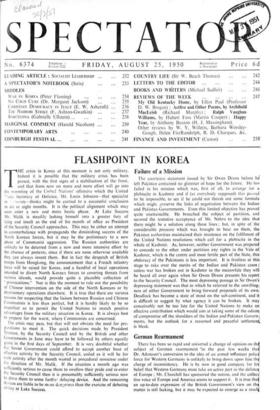German Rearmament
There has been so rapid and universal a change of opinion on th subject of German rearmament in the past few weeks tha Dr. Adenauer's conversion to the idea of an armed volunteer polic force for Western Germany is unlikely to bring down upon him th charge of inconsistency. He is by now in good company for hig belief that Western Germany must take an active part in the defen of Europe ; Mr. Churchill has sponsored the notion, and the collec tive voice of Europe and America seems to support it. It is true tha an up-to-date expression of the British Government's view on thal matter is still lacking, but it may be expected to emerge as a result
of Sir Ivone Kirkpatrick's visit to London and may well go some of the way to meet the German Chancellor's wishes. The argument in favour of German rearmament is obvious—perhaps too obvious. An exposed Western Germany, conscious of its own defencelessness before the growing power of Russia and her satellites, is a psycho- logical as well as aN strategic weakness to Western defence. The idea of 25 German divisions leagued with the Atlantic Treaty Powers is more attractive than the idea of a dozen Allied divisions trying to protect German territory as well as their own. But the idea has also two fundamental drawbacks. The first is the question of arms. Unless Germany is self-supporting in armaments she cannot be an immediate asset ; there is no point in diverting to Germany American or other arms which are urgently needed else- where. At present the defence plan on which the Allies are working is a two-year one, and it is unlikely that within two years German factories could be producing the bulk of the equipment that is needed for rearmament. The second objection is even more real ; it is that a rearmed Western Germany would almost automatic- ally be compelled to undertake adventures in the East—first the incorporation of the Eastern Zone and then the revision of the Polish frontiers. It is possible to argue that both the creation of a German army and the reunion of Germany are, sooner or later, historically inevitable, and that it is therefore better that they should be sponsored now than suffered later. To reinforce this argument there is the apparent preference among Germans themselves for their national contribution to form part of a united European defence force on the lines advocated by Mr. Churchill, and if this mood offered a chance to effect the military integration of Germany in Europe it would be folly to turn a cold shoulder to it. But in Germany as elsewhere opinion about the scope of German rearma- ment has suddenly outrun reality. A German army cannot be created overnight, and the object of the force for which Dr. Adenauer is asking is primarily to preserve internal security. In Western Germany, it is true, the internal and external threats are essentially the same, but for good or evil the protection of Western Germany against the external threat from the East during the " breathing-space " of which Mr. Churchill has spoken must remain a non-German responsibility.































